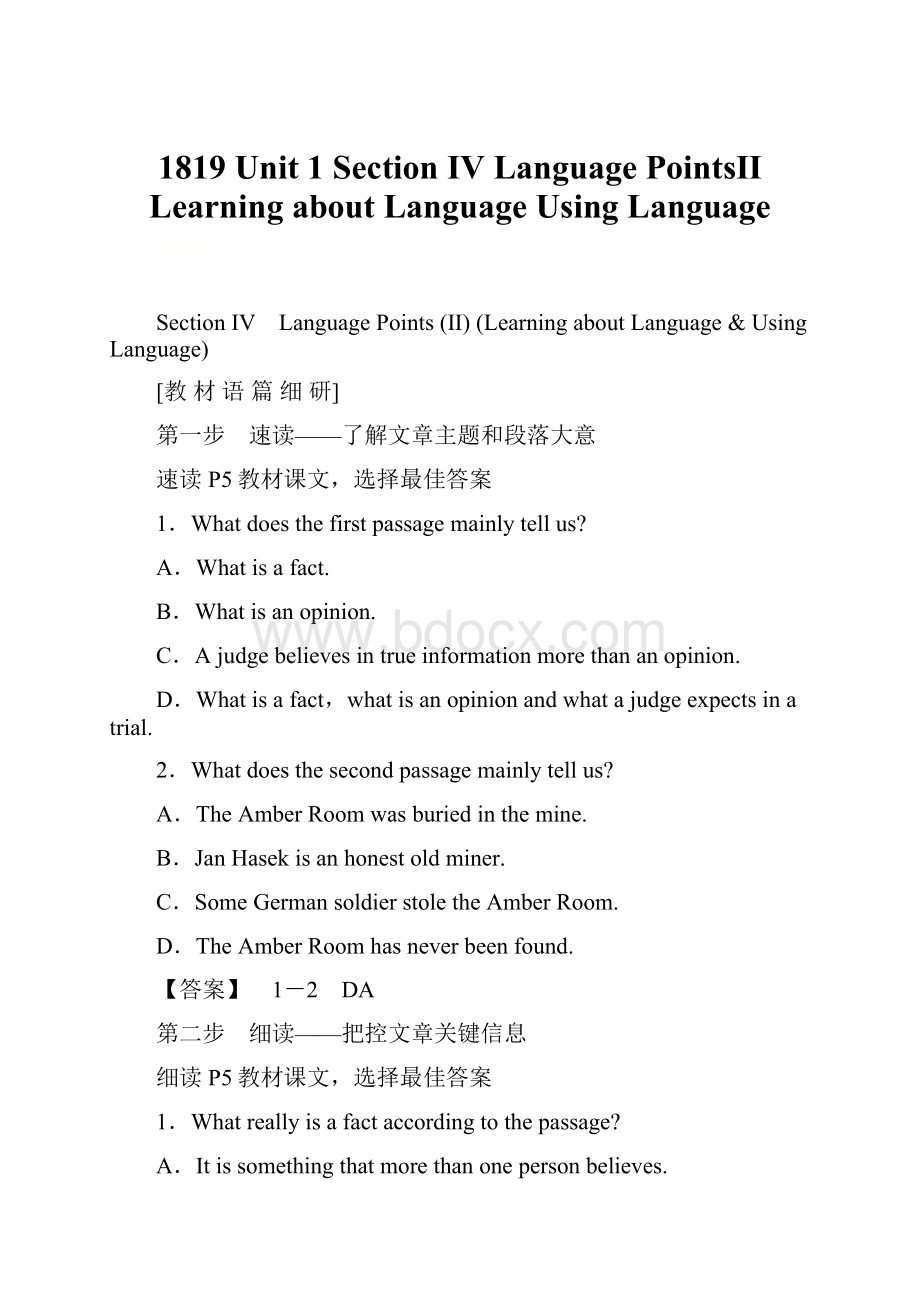1819 Unit1 Section Ⅳ Language PointsⅡ Learning about LanguageUsing Language.docx
《1819 Unit1 Section Ⅳ Language PointsⅡ Learning about LanguageUsing Language.docx》由会员分享,可在线阅读,更多相关《1819 Unit1 Section Ⅳ Language PointsⅡ Learning about LanguageUsing Language.docx(13页珍藏版)》请在冰豆网上搜索。

1819Unit1SectionⅣLanguagePointsⅡLearningaboutLanguageUsingLanguage
SectionⅣ LanguagePoints(Ⅱ)(LearningaboutLanguage&UsingLanguage)
[教材语篇细研]
第一步 速读——了解文章主题和段落大意
速读P5教材课文,选择最佳答案
1.Whatdoesthefirstpassagemainlytellus?
A.Whatisafact.
B.Whatisanopinion.
C.Ajudgebelievesintrueinformationmorethananopinion.
D.Whatisafact,whatisanopinionandwhatajudgeexpectsinatrial.
2.Whatdoesthesecondpassagemainlytellus?
A.TheAmberRoomwasburiedinthemine.
B.JanHasekisanhonestoldminer.
C.SomeGermansoldierstoletheAmberRoom.
D.TheAmberRoomhasneverbeenfound.
【答案】 1-2 DA
第二步 细读——把控文章关键信息
细读P5教材课文,选择最佳答案
1.Whatreallyisafactaccordingtothepassage?
A.Itissomethingthatmorethanonepersonbelieves.
B.Itissomethingthatmorethanonepersonhasseenordone.
C.Itisanythingthatcanbeproved.
D.Itisanythingthatisbelievedoracceptedbymostpeople.
2.Chinahasthelargestnumberofpeopleintheworld.________.
A.Itisafact B.Itisanopinion
C.ItisanevidenceD.Allthethree
3.Inatrialajudgemustconsidertheeyewitness'________.
A.appearanceB.job
C.opinionD.facts
4.Howdoesthewriterexplainthetwotermsof“fact”and“opinion”?
A.Bygivingexamples.
B.Bygivingdefinitions(定义).
C.Bygivingevidence.
D.BothAandB.
5.In1945JanHaseksaw________.
A.somethingexploded
B.theminewasclosed
C.someGermansoldiers
D.theAmberRoom
【答案】 1-5 CADDC
第三步 精读——能力升华 接轨高考
根据P5课文内容,改正下列文中的10处错误
Afactisanythingwhichcanbeproved.Foranexample,itcanbeprovedthatChinahasmanypeoplethananyothercountryintheworld.Anopinioniswhatsomeonebelieveistruebuthasnotbeenproved.Forexample,itisanopinionifyousay“Catsarebetterpetsthandogs”.Itmaybetrue,butitisdifficultlytoprove.Somepeoplemaynotagreethisopinionbuttheyalsocannotprovethatweareright.
Inatrial,thejudgedoesnotconsiderhoweacheyewitnesslookslike.He/Sheonlycaresaboutwhethertheeyewitnesshasgiventrueinformations.Thiskindofinformationiscallingevidence.
【答案】
Afactisanything
canbeproved.For
example,itcanbeprovedthatChinahas
peoplethananyothercountryintheworld.Anopinioniswhatsomeone
istruebuthasnotbeenproved.Forexample,itisanopinionifyousay“Catsarebetterpetsthandogs”.Itmaybetrue,butitis
toprove.Somepeoplemaynotagree
thisopinionbuttheyalsocannotprovethat
areright.
Inatrial,thejudgedoesnotconsider
eacheyewitnesslookslike.He/Sheonlycaresaboutwhethertheeyewitnesshasgiventrue
.Thiskindofinformationis
evidence.
[语言基础自测]
Ⅰ.单词拼写
根据汉语或首字母提示,写出下列单词
1.Thisisaninformal(非正式的)meeting.
2.Therobberwillbeontrial(审讯)nextweek.
3.Thebombexploded(爆炸)butnobodywasinjured.
4.Canyoushowmeanyevidenceforyourstatement?
5.Thequestionoftheoriginoftheuniverseisstillhotlydebated.
6.Theboatwassinkingslowly,whichmadethepassengersworried.
Ⅱ.拓展词汇
根据词性和汉语提示,写出下列单词
1.explodevi.爆炸→explosionn.爆炸
2.paintv.油漆;绘画→paintingn.绘画;画
3.formaladj.正式的→informal(反义词)adj.非正式的
4.evidentadj.清楚的;明白的;显而易见的;显然的→evidencen.根据;证据
Ⅲ.补全短语
根据提示补全下列短语
1.takeapart 拆开;分开
2.thinkhighlyof看重;器重
3.debatewithsb.over/aboutsth.与某人辩论某事
4.inatrial在审判中
5.careabout关心;在乎
6.ratherthan而不是
7.theentranceto...……的入口
Ⅳ.选词填空
选用上述短语的适当形式填空
1.IthinkI'llhaveacolddrinkrather_thancoffee.
2.Theonlythingheseemstocare_aboutismoney.
3.Hisbossthought_highly_ofhimforhisachievementslastyear.
4.Take_apartthemachinetoseeifthere'ssomethingwrongwithit.
Ⅴ.经典句式仿写
1.Onedayhewaslookinginasecond�handfurnitureshopwhenhe...
一天,他正在一家二手家具店里逛,这时他突然……
[记句式结构]bedoingsth....when...正在做某事,这时(突然)……
[仿写促落实]Iwas_thinking_of_this_whenIheardmynamecalled.
我正想着这件事,突然听到有人叫我的名字。
2.Forexample,itcanbeprovedthatChinahasmorepeoplethananyothercountryintheworld.
举例来说,中国人口比世界上其他任何一个国家的人口都多,这是可以得到证实的。
[记句式结构]it作形式主语,that从句为真正的主语
[仿写促落实]It_has_been_proved_thatwhathesaidisright.
已经证实他说的话是对的。
3.Inatrial,ajudgemustdecidewhicheyewitnessestobelieveandwhichnottobelieve.
在审判中,法官必须断定哪些证人可以相信,哪些证人不能相信。
[记句式结构]“疑问词+不定式”结构作宾语
[仿写促落实]Wehaven'tdecidedwhen_to_leave_forBeijing.
我们还没有决定何时出发去北京。
4.NordoIthinktheyshouldgiveittoanygovernment.
我认为他们不应该把它交给任何一个政府。
[记句式结构]否定词nor位于句首引起部分倒装
[仿写促落实]Shecouldn'tworkouttheproblem,nor/neither_could_I.
她解决不了这个问题,我也不能。
[核心要点探究]
(教材P3)Onedayhewas_lookinginasecond�handfurnitureshopwhenhesawanamazingobjectamongthemanydifferentvasesandjewels.
一天,他正在一家二手家具店里逛,这时他突然在众多不同的花瓶和首饰中看见了一个很奇特的东西。
【要点提炼】 bedoing...when...意为“正在做……这时(突然)……”,when在句中作并列连词。
相当于andthen,andatthattime。
beabouttodo...when... 正要做……这时……
beonthepointofdoing...when...正要做……这时……
hadjustdone...when...刚做完……这时……
①Iwasabouttoleavewhenitbegantorain.
我正要离开,就在这时开始下雨了。
②Iwasonthepointofspeaking(speak)whenmywifestoodupandstoppedme.
我正要开口说话,这时妻子起身阻止了我。
③Hehadjustrushedintotheclassroomwhentheteachercamein.
他刚跑进教室,这时老师进来了。
takeapart拆开
(教材P4)TheoldmansawsomeGermanstakingaparttheAmberRoomandremovingit.
老人看到一些德国人拆除并移走了琥珀屋。
(1)tell...apart把……区别开来
fallapart崩溃;土崩瓦解
(2)takeback收回;使回忆起
takeoff脱下;起飞
takeon呈现;开始雇用
takeup产生兴趣;开始从事;占用;拿起
①TheyaresomuchalikethatIcan'ttellthemapart.
他们那么像以至于我很难把他们区分开。
②Hedroppedmedicineandtookupphysics.
他放弃学医,开始学物理。
③Takebackwhatyousaid,oryouwillregret.
收回你说的话,否则,你会后悔的。
(教材P5)Forexample,it_can_be_proved_thatChinahasmorepeoplethananyothercountryintheworld.
举例来说,中国人口比世界上其他任何一个国家的人口都多,这是可以得到证实的。
【要点提炼】 句中“itcanbeprovedthat...”为“it+be+过去分词+that...”结构。
在该结构中,it为形式主语,that从句为真正的主语。
英语中把主语从句后置,同时把形式主语it放在主语位置的常见句型有:
(1)Itis+过去分词(reported,believed,said,announced等)+主语从句(该结构可与“Sb./Sth.+be+过去分词+todo...”结构相互转换)
(2)It+不及物动词(seem,happen,turnout,appear等)+主语从句
(3)Itis+名词词组(apity,afact,awonder,anhonour等)+主语从句
(4)Itis+adj.(clear,natural,obvious,possible,likely等)+主语从句
①Itisreportedthatthefilmstarwillcometoourcity.据报道那位电影明星将来我们市。
②Itisapitythatyoucan'tgowithustoenjoytheconcert.
你不能跟我们一块去欣赏音乐会真是可惜。
③Itissaidthathestudiedabroad,butwedon'tknowwhichcountryhestudiedin.=Heis_said(say)tohavestudiedabroad,butwedon'tknowwhichcountryhestudiedin.据说他在国外学习过,但是我们不知道他是在哪个国家学的。
evidencen.证据;证明;证词;根据
(教材P5)Soanopinionisnotgoodevidenceinatrial.因此,在审判中,观点并不是强有力的证据。
(1)provide/giveevidencefor 提供……的证据
Thereissome/noevidencethat...(没)有证据证明……
inevidence显眼;显而易见
(2)evidentadj.明显的;明白的
It'sevidentthat...很明显……
①There'ssomeevidencethatoutdooractivitiesaregoodforus.
有证据证明,户外活动对我们有好处。
②Itisevidentthatsmokingisharmfultohealth.
很明显,抽烟对健康有害。
③Atpresentwehavenoevidence(evident)oflifeonotherplanets.
目前我们没有在其他行星上存在生命的证据。
[名师点津]
在“Thereissome/noevidencethat...”句型中,that引导的是同位语从句,说明evidence的具体内容,而且There不可以改为It。
ratherthan与其……倒不如;是……而不是
(教材P5)He/Sheonlycaresaboutwhethertheeyewitnesshasgiventrueinformation,whichmustbefactsratherthanopinions.
他/她关心的只是目击者是否提供了真实的信息,这些信息必须是事实而不是个人观点。
(1)ratherthan连接两个并列成分,意为“而不是”。
(2)ratherthan连接两个主语时,谓语动词应与ratherthan前面的主语在人称和数上保持一致。
(3)woulddo...ratherthando...=wouldratherdo...thando...=prefertodo...ratherthando...=preferdoing...todoing...宁愿做……也不愿做……
①Wewillhavethemeetingintheclassroomratherthaninthegreathall.
我们将在教室里开会,不是在大厅里。
②YouratherthanIare(be)goingtogocamping.
是你而不是我要去野营。
③Shepreferredgoingwithustostayingbehind.=Shepreferredto_go(go)withusratherthanstaybehind.=Shewouldrathergowithusthanstay(stay)behind.=Shewouldgo(go)withusratherthanstaybehind.她宁愿跟我们一起去也不愿留下来。
explodevi.爆炸;爆发
vt.使爆炸;使爆发
(教材P5)InApril1945Iheardsomethingexplodeatmidnight.
在1945年四月份,我在半夜听到有东西爆炸的声音。
(1)explodewith... 爆发……;突发……
explodewithanger勃然大怒;大发脾气
explodewithlaughter哄堂大笑
(2)explosionn.爆炸;爆炸声
①Atlasthisangerexploded,buthecalmeddownafterawhile.=Atlastheexplodedwithanger,buthecalmeddownafterawhile.
他终于大发雷霆,但是过了一会就镇静下来了。
②Ifthegaspipeexplodes(explode),theexplosion(explode)maydogreatdamagetothebuildingsaround.
如果管道发生爆炸,爆炸会对周围的楼房造成极大损害。
thinkhighlyof器重;看重
(教材P7)IthinkhighlyofthosewhoaresearchingfortheAmberRoom.
我很欣赏那些为寻找琥珀屋而努力的人们。
thinkwell/muchof 对……评价很高;看重;欣赏
thinkpoorly/little/badlyof对……评价不高/差/轻视
thinknothingof觉得……没什么/不难
speakhighlyof...高度评价……
speakwell/illof...说……的好/坏话
①Heoftentellslies,whichmakesothersthinkpoorly/ill/badlyofhim.
他经常撒谎,这使得别人看不起他。
②Judgingfromhisexpression,hedoesn'tthinkwell/muchofyourplan.
从他的表情判断,他对你的计划评价不高。
③Hethinksnothingofwalkingfourmilestoworkandbackeveryday.
每天上下班步行四英里他觉得没什么。
④Ifyouwantpeopletothinkwellofyou,donotspeakwellofyourself.
要想让人们欣赏你,就不要自夸。
[名师点津]
当thinkhighly/well/muchof...用于被动语态结构时,副词应放于其修饰的动词前,即behighly/well/muchthoughtof。
(教材P7)Nor_do_Ithinktheyshouldgiveittoanygovernment.
我认为他们不应该把它交给任何一个政府。
【要点提炼】 否定词nor位于句首,应该用部分倒装。
形式为:
“nor+be动词/助动词/情态动词+主语+动词+其他”。
表示前面的否定情况也适用于另一人或物,可用neither替换nor。
(1)若表示前句中的肯定情况也适用于另一人或物,要用“so+be动词/情态动词/助动词+主语”,表示“……也是这样,也是如此”。
(2)当前句中既有肯定的情况也有否定的情况,两种不同的情况也适用于另一人或物时,则用以下句式:
Itisthesamewithsb./sth.或Soitiswithsb./sth.
①Idon'tknowabouthissecrets.NordoIcare.
我不知道他的秘密,我也不关心。
②Tomisverycleverandstudiesveryhard.ItisthesamewithMary/SoitiswithMary.
汤姆聪明且努力学习,玛丽也一样。
③HelikesswimmingandsodoI.
他喜欢游泳,我也是。
④Tomisn'tgoodatmaths,neither/noramI.
汤姆不擅长数学,我也是。
[名师点津]
如果后一句只是单纯地重复前一句的意思,此时主谓不倒装,句型为“so+主语+be动词/助动词/情态动词”。
—ShespeaksFrenchverywell